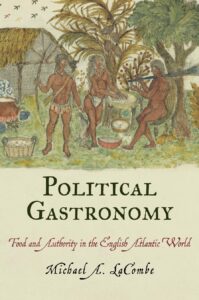Political Gastronomy: Food and Authority in the English Atlantic World – Michael A. LaCombe
 Political Gastronomy: Food and Authority in the English Atlantic World. By Michael A. LaCombe. (Philadelphia: University of Pennsylvania Press, 2012. pp. 224. Cloth, $49.95.)
Political Gastronomy: Food and Authority in the English Atlantic World. By Michael A. LaCombe. (Philadelphia: University of Pennsylvania Press, 2012. pp. 224. Cloth, $49.95.)
I like to read food history and histories of colonial America, though I am no means an expert in either, so it is hard for me to place this book in the context of the historiography of either subject, though it definitely contains original arguments and research, as in topics I have not read about before.
Keeping this in mind, my initial reaction to the beginning of Political Gastronomy was that is read very much like other histories of the relationships between Indigenous people, colonists, and food. By this I mean the way colonists depended on the Indigenous people for food during their initial settlement. The prototypical example, Jamestown, is used here. This all seems like familiar history.
What LaCombe does so well is give a deeper history of these relationships, exploring how things like ritual and honor played a role in what LaCombe might call food politics. One of the most interesting points LaCombe makes is how leaders’ ability to provide subordinates with food related to their political legitimacy as leaders. He says:
First, to accuse a leader of misusing the food supply was a potent charge, one that portrayed him as corrupt and tyrannical. But the potency of this accusation grew from the fact that misusing the stores was more than a metaphor for tyranny: it questioned a man’s fitness to govern at the most basic level. For the early modern English, the bonds of reciprocal obligation that underpinned political relationships were rooted in food – finding, hunting, or growing it; distributing it to subordinates, guests, and dependents; and consuming it – more than in any realm of social life (133).
Controlling and distributing food judiciously defined a man’s honor, and therefore the legitimacy of his leadership. Most of the examination we get of this aspect of food culture comes from the English side of the equation. LaCombe is able to examine the colonists and even the English back home apart from Indigenous peoples, probably relating to the availability of sources. Indigenous peoples almost only feature in the context of their relationships with the colonists. Still, it is interesting to see how important food culture was to both sides, sometimes in not unfamiliar ways.
I think you could use this book in an undergraduate class to extract information about colonial relationships as well as the role of food as a cultural artifact. It would work well in an undergraduate or graduate survey of colonial American course, keeping in mind that is needs to be contextualized in the wider discourse. Again, I am not sure were this books falls in the historiography of food history and/or colonial history, but I think it has some important arguments to make and just because it tackles a familiar subject doesn’t mean it has nothing interesting or new to say.
